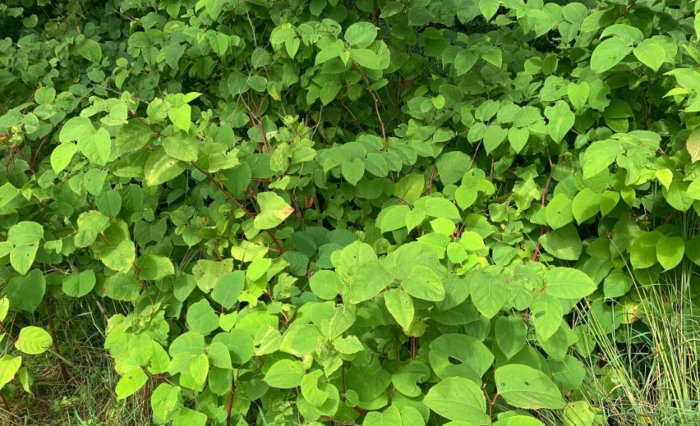
If you’ve ever heard of Japanese knotweed, then you probably already know that it’s never a good thing to find it growing on your property. There are several dangerous plants that grow in the UK, but is knotweed one of them?
There are many different ways in which a plant can be considered to be dangerous, so let’s break it down and answer the question is Japanese knotweed dangerous?
Is Japanese knotweed dangerous to eat?
No, Japanese knotweed isn’t dangerous to eat – in fact, knotweed apparently has a taste very similar to rhubarb! There are a range of different knotweed recipes online, ranging from savoury starters to sweet desserts.
If you’re so inclined, knotweed is perfectly safe to eat, by animals and humans alike. While Japanese knotweed isn’t poisonous, if you eat Japanese knotweed and experience any kind of adverse reaction, seek medical assistance immediately. Never eat any knotweed that has been treated with herbicide.
Is Japanese knotweed dangerous to touch?
There are many plants in the UK that can cause you physical harm if you touch them such as giant hogweed and stinging nettles, but Japanese knotweed is not dangerous to touch. All areas of the knotweed plant are safe to handle.
However, when handling Japanese knotweed, you should always be careful to avoid inadvertently spreading it. The spreading of knotweed (even accidentally) is a crime under Schedule 9 of the Wildlife and Countryside Act 1981.
In what ways is Japanese knotweed dangerous?
So, if knotweed isn’t dangerous to eat or dangerous to touch, how is it dangerous?
Knotweed can be dangerous in a number of different ways. Due to its rapid growth, knotweed is capable of quickly overtaking and dominating any area, easily outcompeting our native plants and taking over their growing space. This has a knock-on effect for our local wildlife, since knotweed is not hospitable and leaves many of our native species without any remaining habitat.
Japanese knotweed can also be physically damaging to structures. Knotweed is capable of growing inside pipes, tangling in underground wires, and even forcing its way in in-between concrete slabs and bricks. If left to its own devices, an extreme knotweed infestation can cause structural instability, leaving buildings compromised and unsafe.
If you’d like to read more on the potential dangers of Japanese knotweed, check out our blog Why Is Japanese Knotweed Bad?
*
If you think you may have Japanese knotweed growing on your property, reach out to Total Weed Control today to arrange your FREE Japanese knotweed survey. One of our knotweed removal professionals will survey your property and let you know if you have a knotweed infestation on your hands, and give you a no-obligation quote as to how much our treatment services may cost.
Free Knotweed Survey
If you’d like to read more about the knotweed removal methods we offer, head on over to our website today!
Japanese Knotweed Removal
Read More: Is Giant Hogweed Dangerous?
